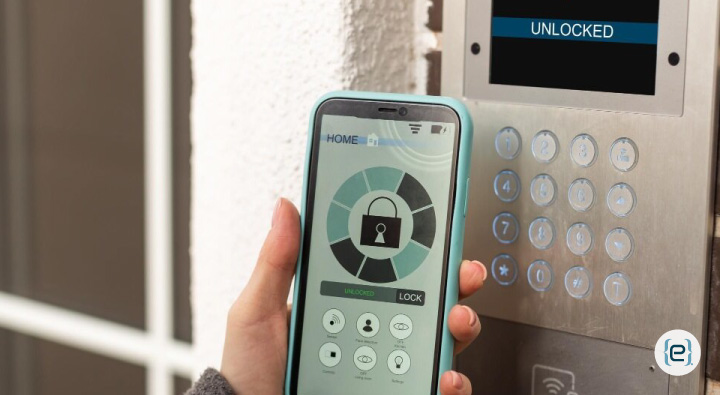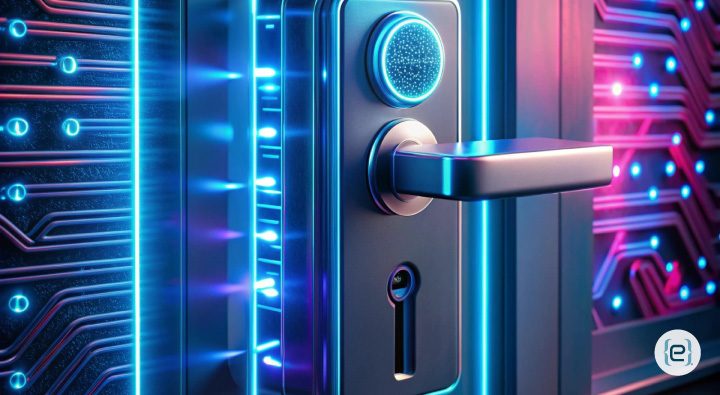.As Cyber Security threats continue to rise, network door locks have become one of the key components for any system. The Network door locks are different from traditional mechanical locks in that networked locks allow the user to remotely manage and monitor access in real-time and also offer control features. Internet access, combined with a large internal Wi-Fi network, allows these smart systems to quickly send new data on who is allowed where and when, logging entries more thoroughly than in the past while keeping better track of everything from consumables to company assets.
What Are Network Door Locks?
Network door locks, or smart door locks (or connected home security solutions), can be used to unlock a keyless smartphone entry in your IoT-enabled access control system. These locks use Wi-Fi, Bluetooth, or Ethernet networks to communicate with a central platform. These locks can also be managed by organizations that could grant or restrict access to individuals remotely through a mobile app, platform-specific software interface, and automated schedules.
Some common features include:
- Mobile app unlocking Keycard PIN code Biometric scanning.
- Entry/attempt of a breach in real-time notifications
- Key fob-less remote lock/unlock capabilities
Pros of Network Door Locks
- Better Security and Access Control: With the network door locks, there is no risk of accumulating a bunch of old keys that could get lost or stolen. Access permissions can be assigned by roles, schedules, or at times, ensuring that only the authorized person enters restricted areas. If necessary, administrators can revoke access on the spot and even disengage a select lock from miles away, so forbidden entry is impossible. Also, security gets a step higher by using biometric authentication to confirm a user’s identity, with unique characteristics such as fingerprints or facial verification.
- Remote Access and Control: One of the biggest advantages that network door locks offer is remote management. Cloud-based platforms and mobile apps allow security personnel or facility managers to automatically lock/unlock doors from anywhere. This is great for businesses that have more than one site or employ remote staff. For example, if an employee leaves her/his key card at home and cannot get in the door, you may unlock it for them remotely, instead of having to deal with physical access issues.
- Log Entries, Detailed and Timely Alerts: Network door locks create access logs that store who entered the area at what time. They also work as logs for auditing to meet industry regulations. One example is that healthcare facilities can monitor areas, such as medication storage rooms, with these systems. Administrators can also receive instant alerts if something goes wrong — for example, multiple incorrect login attempts, or open doors, helping them to mitigate potential attacks as quickly as possible.
- Improved operational efficiency: Network door locks take care of multiple issues regarding access control. Organizations can employ schedules that automatically unlock and lock doors on a predetermined basis, reducing the need for human intervention. They can also integrate these systems with human resources software to ensure that only active employees have access. Also, they can remove permissions when individuals leave the organization. Ease of central management ensures optimal efficiency and low administrative overhead.
- Scalability and Integration: Network door locks are suitable for all sizes of organizations, and can easily be integrated. Business can start with just a few locks and slowly build out the system without making any substantial infrastructure changes. Network locks also work alongside current security systems, like CCTV cameras & DVRs (Digital Video Recorders). Also, they work with Fire and Burglar Alarm Systems, and Doorbells with Camera Eyes. This way, they can communicate from the main entrance door or gate of your house to you. This allows for a cohesive security platform that gives a holistic view of access and security around the facility.

Uses of Network Door Locks
- Business and Office Buildings: In office areas, network door locks control access to meeting rooms, server rooms, or other restricted areas. They also give remote workers flexibility to enter buildings without a physical key.
- Healthcare Facilities: Networked locks protect pharmaceutical storage areas, patient records, and critical care units. Biometric access restricts sensitive zone entry to certified personnel, such as doctors or nurses.
- Educational Institutions: Network Door Locks control who gets into classrooms, labs, and administrative offices. Using time-based access control, you can also restrict facilities, so they are only accessible during regular working hours.
- Hospitality and Retail: Hotels and resorts can use mobile service technology to enable keyless entry for guests. Retail environments use these locks to keep secure areas and back offices safe from theft.
- Industrial premises and Warehouses: Network door locks provide enhanced security for industrial plants and warehouses. This way. you can restrict access to areas like hazardous material storage zones or control rooms to authorized personnel.
Overcoming Challenges
- Network Dependency: These locks depend on the internet to operate, so if there is a blackout or other damage to network connections. Then, you will need redundancy measures like local fail-safes and backup power to maintain uninterrupted operations.
- Cyber Security Risks: Cyber Attacks can affect networked locks, so you need to keep up to date with patches and use encryption. Also, use multi-factor authentication to keep your software secure.
- Initial Investment: Network locks require a strong infrastructure. So, they can be costly for larger installations (although the long-term gain make this cost seem like peanuts).
Trained professionals from eMazzanti can help you to select, install and maintain Network Door Locks and other useful digital tools.







